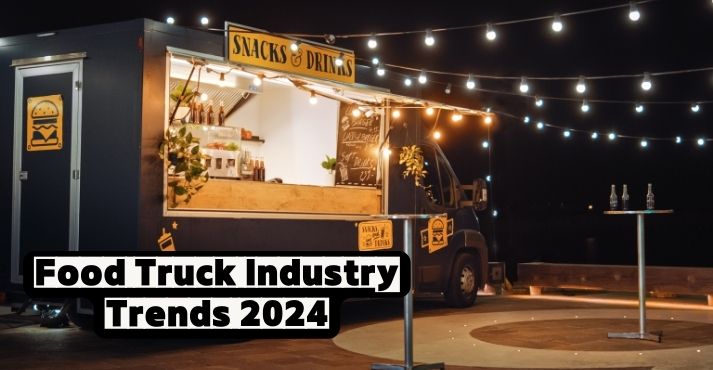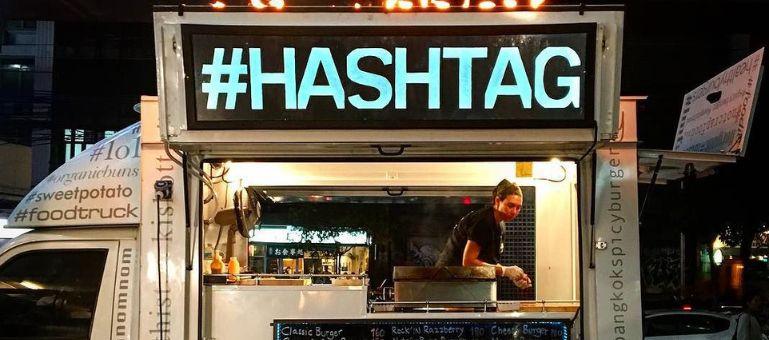Food trucks, a staple in the modern food landscape, continue to increase in popularity. This blog delves into the latest Food Truck Industry Trends for 2024.
As these mobile eateries gain momentum, understanding the prevailing trends becomes crucial for enthusiasts and entrepreneurs alike. From tech integrations to diverse global flavors, we’ll explore the key factors shaping the future of food trucks.
Let’s unravel the dynamic landscape of the Food Truck Industry, offering insights and foresight for those keen on staying on the industry’s trajectory in the year ahead.
Food Truck Industry Overview

The Food Truck Industry Overview in 2024 reveals a dynamic landscape marked by substantial growth and evolving consumer preferences.
Analyzing current data, the sector demonstrates a remarkable surge globally.
The projected growth of the global food truck market indicates an increase from $19.4 billion in 2022 to a forecasted $26.3 billion by 2027, reflecting a compound annual growth rate (CAGR) of 6.2% spanning the years 2022 through 2027.
In the Asian food and beverage industry, discernible trends shape the market, influencing food truck offerings.
The Food Truck Industry Analysis indicates a steady rise in revenue, with an increasing number of entrepreneurs capitalizing on this trend. Consumer awareness around food trucks has soared, driven by a desire for diverse culinary experiences.
As the industry expands, tech integration and sustainable practices emerge as prominent trends. In this thriving sector, innovation and convergence of consumer demand create a promising future for food trucks worldwide.
Upcoming Trends in the Food Truck Industry
As the food industry continually evolves, staying abreast of emerging trends is paramount. In the scope of street cuisine, the upcoming Food Truck Trend is poised to redefine culinary landscapes.
From innovative menu concepts to strategic food brand promotions, let’s delve into the anticipated Food Truck Industry Trends that will shape the gastronomic scene in 2024.
1. Sustainability and Eco-Friendly Practices

In an era where environmental consciousness is paramount, the food truck industry increasingly prioritizes sustainability, evident in practices like eco-friendly packaging and responsible sourcing.
Real-world illustrations showcase sustainable food trucks successfully adopting green initiatives. These include using sustainable food packaging and environmentally friendly practices that resonate positively with customers.
The intersection of sustainability and the food truck sector is a response to societal demands and a strategic move to enhance customer loyalty.
As per current Food Truck Industry Statistics and insights into the Food Trucks Market Size, the integration of sustainable practices not only aligns with consumer values but also contributes to the overall growth and positive perception of the industry.
2. Vegan and Plant-based Alternatives Menu
A noteworthy trend within the Food Truck Industry is the integration of healthier options, mainly vegan and plant-based alternatives, catering to the growing demand for nutritious choices.
Food trucks are increasingly diversifying their menus to include vegan offerings, responding to the rise in health-conscious consumers. Latest Food Truck Trends highlight successful ventures that have adapted to this shift, presenting innovative and delicious plant-based options.
This trend aligns seamlessly with broader dietary shifts, reflecting a societal move towards healthier lifestyles. The surge in Food Truck Popularity is partly attributed to this responsiveness to evolving consumer preferences, marking a significant theory shift in the industry’s culinary offerings.
As food trucks align with contemporary dietary trends, their popularity will likely persist and grow among diverse consumers.
3. Food Trucks at Events

Regarding Food Truck Industry Trends, food trucks are finding exciting opportunities by partnering with local businesses and participating in food exhibitions, festivals, and events. These collaborations are like delicious partnerships that capture people’s attention.
Imagine a food truck teaming up with a nearby café or making waves at a food fest – it’s not just about the food; it’s about creating memorable experiences. These collaborations are a smart move.
By working together, food trucks can reach more folks and spread their tasty treats to new places, expanding their horizons and leaving a lasting impression.
In the world of food trucks, it’s not just about what’s on the menu; it’s about crafting connections and growing their presence, one event at a time.
4. Technology Integration
Technology is taking a front seat in the food truck industry and related trends as food trucks embrace innovative ways to serve customers. Many trucks now leverage mobile apps and online ordering systems, bringing convenience directly to hungry customers’ fingertips.
This tech-savvy approach enhances efficiency and aligns with the broader trend of increasing Food Truck Popularity.
Moreover, emerging tech trends are reshaping the food truck experience. Contactless payments are becoming the norm, ensuring customers and vendors a safer and faster transaction process.
Virtual food trucks, a cutting-edge concept, allow customers to explore and order from a truck’s menu without the physical presence, expanding the reach of these mobile kitchens.
As technology continues to evolve, its integration into the food truck scene remains a crucial driver of industry trends and the transformation of food service operations.
5. Themed Food Trucks
In the ever-evolving Food Truck Industry Trends, a notable phenomenon is the rise of themed food trucks, each catering to unique and niche markets. These trucks aren’t just about food; they’re about creating an entire experience that resonates with specific interests. Take, for instance, trucks specializing in gaming-inspired snacks or those bringing movie-themed munchies to life.
- Gaming Gastronomy: Picture food trucks catering to gamers, serving snacks inspired by favorite video games.
- Movie Magic on Wheels: Some trucks bring movie magic to the streets, offering themed bites inspired by beloved films.
This thematic branding isn’t just about the menu; it’s a way these trucks set themselves apart. By immersing customers in an experience beyond the taste buds, themed food trucks carve out a unique niche, contributing to the diverse and dynamic landscape of the food truck phenomenon.
6. Customer Engagement and Social Media

In the ever-evolving scope of Food Truck Trends, the significance of customer engagement and social media cannot be overstated.
Social media platforms have become pivotal for food trucks, acting as dynamic channels for interaction and promotion. Engaging content, including enticing food photos and behind-the-scenes glimpses, captivates audiences and builds community.
Strategies for Connection:
- Digital Delights: Food trucks leverage platforms like Instagram and Twitter to share mouthwatering visuals, enticing customers with a virtual taste of their offerings.
- Live Updates and Interactions: Through live updates and direct interactions, food trucks create a real-time connection, updating customers on locations and menu specials and engaging in conversations.
A prime example is World Food Trucks, which utilizes Instagram stories for daily location updates and engages followers through polls to determine popular menu items. This approach fosters a sense of anticipation and allows for direct customer input.
Impact on Brand Loyalty:
Customer engagement isn’t just a trend; it’s a strategic move. The more food trucks connect with their audience, the stronger the bond becomes, and the more food brand promotion increases.
This engagement translates into brand loyalty, as customers feel a personal connection with the truck, making them more likely to return and recommend the experience to others.
Conclusion
In conclusion, exploring the diverse array of Food Truck Industry Trends unveils a dynamic landscape where innovation meets culinary delight.
From sustainable practices and vegan offerings to themed trucks and tech integration, these trends shape not just what’s on the menu but the entire food truck experience.
As we roll through the exciting world of food trucks, it’s evident that these mobile kitchens aren’t just about serving meals; they’re about creating memorable moments and connecting with diverse tastes.
The ongoing evolution in the food truck scene reflects keen responsiveness to changing consumer preferences and the constant pursuit of culinary excellence on the move.
Embracing these trends keeps the wheels turning and propels the food truck phenomenon into an ever-bright future of flavors and experiences.













